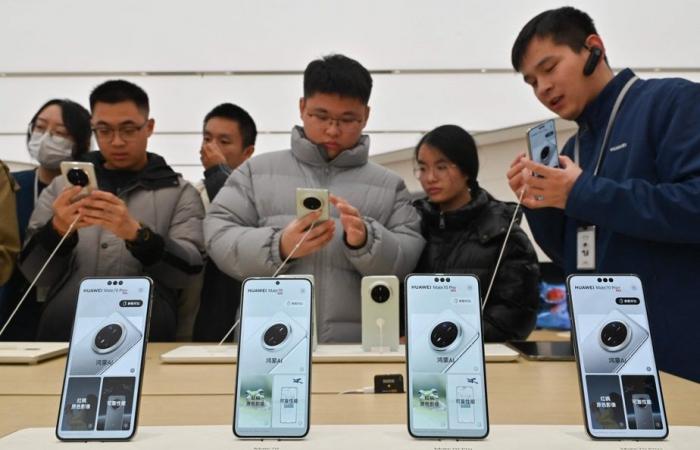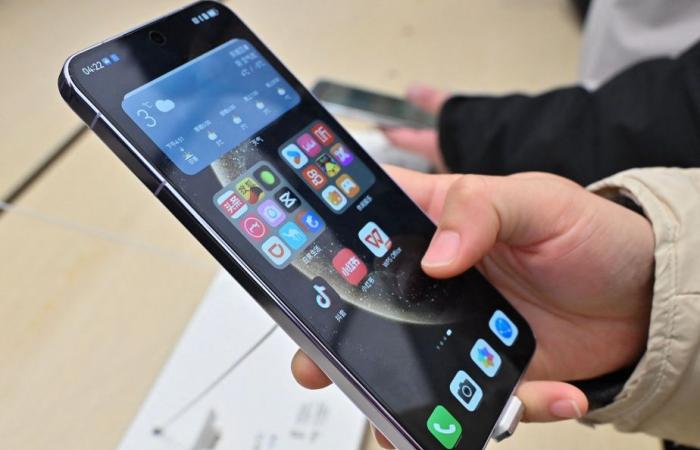(Beijing) Chinese technology giant Huawei on Tuesday unveiled its first smartphone equipped with an operating system entirely developed in-house, a crucial step in its desire to counterbalance the domination of foreign technology leaders.
Posted at 7:04 a.m.
Peter CATTERALL and Luna LIN
Agence France-Presse
Apple’s iOS and Google’s Android systems are used in the majority of mobile devices today.
But Huawei is looking to buck the trend with a new series of Mate 70 phones, powered by its HarmonyOS Next operating system.
This launch marks a major turning point for the firm, which was once paralyzed by American sanctions, but whose sales have rebounded for two years.
“Today, the highly anticipated Mate 70, the most powerful ever, is here,” Richard Yu, president of the company’s consumer business, announced Tuesday at a group conference from its headquarters in Shenzhen. (southern China).
More than three million devices have already been pre-ordered, according to Huawei’s online sales platform, although this does not necessarily mean they have been purchased. The sale officially begins this Tuesday evening in China.
Huawei is at the heart of technological rivalries between China and the United States, which claim, without evidence, that Chinese equipment could be used for espionage. These accusations are strongly denied by Beijing.
Since 2019, American sanctions have hit Huawei’s phone production hard, notably prohibiting the group from using American technologies and components.
“Considerable” expectations
This standoff should intensify with the return to the White House of Donald Trump. The Republican tycoon has promised to drastically increase customs duties on imported Chinese products, in response to trade practices he considers unfair.
“This trend toward self-sufficiency within China’s technology sector has made Huawei’s progress possible,” says Toby Zhu, an analyst at market research firm Canalys.
PHOTO ADEK BERRY, AGENCE FRANCE-PRESSE
The sale of Mate 70 devices begins Tuesday evening in China.
According to him, the success of this new product will be a key indicator of whether the group’s efforts have paid off.
“This new generation of products cannot afford to miss the boat, because expectations are considerable,” adds the analyst.
Huawei was China’s largest smartphone maker until the tech conflict between Beijing and Washington erupted.
In the third quarter of 2024, Huawei only represented 16% of sales in the Chinese market, for less than 11 million units sold, according to a Canalys report.
In September, the firm unveiled the world’s first tri-folding phone, the Mate XT, selling for the equivalent of around 3,920 Canadian dollars.
The new Mate 70 smartphone is offered at a much more affordable starting price, at $758, Huawei announced on Tuesday.
Unlike previous versions, designed with Android support, HarmonyOS Next, however, requires the adaptation of applications to this new operating system.
Apps to adapt
“Chinese companies are ready to invest to contribute to this new Huawei ecosystem, but the ability of HarmonyOS to deliver the same number of applications and features to consumers around the world remains a challenge,” judges Gary Ng.
Huawei has announced that Mate 70 buyers will have the choice of whether or not to use the new HarmonyOS Next version.
“Many” applications available on the platform are already updated daily, said Richard Yu during the launch ceremony.
“We believe that within two or three months, the user experience of applications in the HarmonyOS ecosystem will be even more mature and more complete,” he added.
But it is not certain that all application designers agree to invest sums, often considerable, to create new versions compatible with HarmonyOS, underlines to AFP Rich Bishop, director of AppInChina, which adapts software foreigners for the Chinese market.
To convince them, “Huawei will need to continually improve its software, provide better support to developers and convince the developer community that it is determined to commit over the long term to develop the HarmonyOS ecosystem,” says Paul Triolo, head of technology policy and China at consultancy Albright Stonebridge Group.







